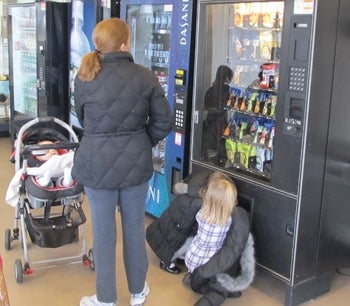Central Massachusetts vending machine company owners say a proposal to hike vending machine license fees in Massachusetts by more than 500 percent — from $3 to $20 — would significantly cripple the vending business. Less than a decade after the fee jumped from just $1 to $3, this latest proposal has local vending machine operators in shock.
“Our industry is being singled out unfairly” in the Patrick administration’s proposal, said Jim Kelly, president of P&J’s Vending Inc. of Hopkinton in an email.
Money For Monitoring?
With the fee increase, the state Department of Public Health (DPH) is looking to fund inspections of vending machines for calorie disclosure of the products they contain. There are 22,000 vending machines in the state.
The hike in fees would generate $374,000 each year, state officials estimated.
But Bob Frotten, president of the Massachusetts Vending Association, said the U.S. Food and Drug Administration hasn’t even issued its calorie-labeling rules for vending machines. Frotten testified on behalf of the vending industry at a public hearing on the fee hike proposal recently. The lack of established calorie-labeling requirements was included in his testimony, as was the alleged singling out of vending operators.
“It’s one business — one business,” Frotten, the president of Taunton-based New England Ice Cream Corp. said of the fee hike proposal. (This is) an industry with a lot of costs, (such as) service (expenses),” he said. “You might get $100 out of each machine, then factor in gas — that’s not a lot to work with,” as far as profit, he said. “These fees are clearly exorbitant.”
Chris Zekos, who owns Candyland Vending of Southbridge and operates about 30 snack and soda vending machines in the Worcester and Marlborough areas, is concerned about profit margin. He’s watching the fee hike proposal carefully, but doesn’t want to pass along the cost to his customers, either. “You’re kind of working with dimes, nickels and quarters,” he said. “It’s not a big profit.”
Small Business Blues
The fee affects mainly small businesses like Zekos’.
In Massachusetts, Frotten said, one vendor controls about 40 percent of the business. The remaining 60 percent is made up of small companies, with 20 or so operators — many of them very small — with just a few hundred machines each, he said. Frotten said the association works to be the voice of these smaller entrepreneurs.
The unfairness of this fee, Frotten said, is made clearer when compared to other fees the state imposes, such as meat-packing license fees — an industry some would argue holds considerably more risk. For meat packers with sales in excess of $10 million a year, a license costs $375 annually. For meat and poultry processors, he said, fees are several hundred dollars each year.
According to an impact statement filed by state officials, the increase is not likely to deter the formation of small businesses.
School Suspension
Frotten also said the vending industry is stigmatized as being responsible for obesity in kids. Though less than 10 percent of vending machines are in public schools, and the industry responded to state School Nutritional Association guidelines by offering healthier fare, vending machine operators are still penalized.
“We have healthier machines with juice and water,” Frotten said. “Schools have restrictions — and we’ve adapted,” he said, but are still paying for the stigma associated with vending.
“They kind of punish us,” Zekos said of the DPH plan to increase fees.
Industrywide, Kelly of P&J’s Vending predicts “this unrealistic increase” could cause industry layoffs.
Vending companies in this area are generally five-to-six person operations, said Andy Houle, key account manager for Polar Beverages in Worcester. “The local vending machine companies are really the ones being affected,” he said. Polar got out of the vending business several years ago, and now uses other vending companies to carry its drink items.
Even Frotten’s company has shifted out of vending. New England Ice Cream sold its vending division to another operator last December, he said. “I don’t want to call us a casualty, but in fact, we are,” he said.
(Material from State House News Service in Boston was used in this report.)

